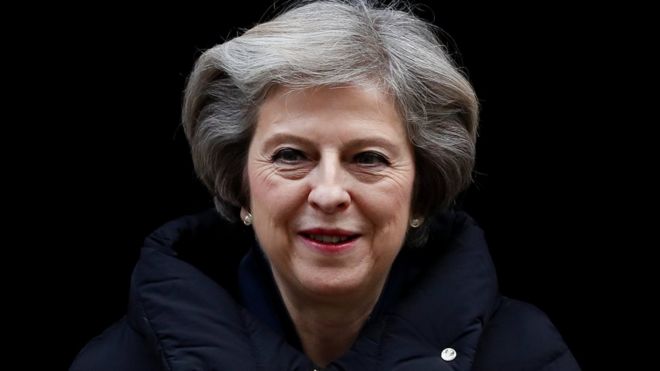May rejects ‘partial’ EU membership in Brexit speech

The UK will not retain “partial” membership of the EU once it leaves, Theresa May will say in her much-anticipated Brexit speech.
The PM will tell other European countries the UK wants to trade with them “as freely as possible” but will not be “half-in, half-out” of the EU.
Her speech is expected to include further hints Britain could leave the EU single market.
Downing Street said she would set out 12 negotiating objectives.
The government has so far revealed few details about what it wants to secure from the Brexit talks.
- What we already know about UK’s Brexit plan
- The trading options explained
- Brexit: All you need to know
But it has said formal negotiations on the UK’s exit package will be triggered by the end of March.
The PM’s speech will be closely watched for signals on what the UK’s future trading relationship with the EU could look like, in particular its involvement in the single market and the customs union.
EU leaders have said the UK cannot “cherry pick” access to the single market while restricting the free movement of people, and Mrs May has suggested curbing migration will be her top priority.
Labour’s Sir Keir Starmer, the Shadow Brexit secretary, said the UK should stay in the customs union.
He told BBC Newsnight: “We have to decide how we front up to these negotiations. We need to aim for the best deal for the UK.
“That’s the deal that works for trade, it’s a deal that accepts there has to be change on freedom of movement rules. That’s the starting position.
“Preserving our ability to trade successfully in Europe has to be the priority for business. Staying in the customs union is the best way to achieve that.”
‘Eyes open’
Addressing an audience including foreign ambassadors in central London, Mrs May will say the UK will be “the best friend and neighbour to our European partners, but a country that reaches beyond the borders of Europe too”.
She will tell the remaining 27 EU member states: “We will continue to be reliable partners, willing allies and close friends.
“We want to buy your goods, sell you ours, trade with you as freely as possible, and work with one another to make sure we are all safer, more secure and more prosperous through continued friendship.”
She will call for a “new and equal partnership” with the EU: “Not partial membership of the European Union, associate membership of the European Union, or anything that leaves us half-in, half-out.
“We do not seek to adopt a model already enjoyed by other countries. We do not seek to hold on to bits of membership as we leave.”
- What’s happened since Brexit vote?
- Kuenssberg: May’s cloak of ambiguity
- How has economy fared since Brexit vote?
People who voted Brexit “did so with their eyes open”, the PM will say, calling the vote a “great moment of national change”.
She will say the country is “coming together” after June’s referendum, adding: “Now we need to put an end to the division and the language associated with it – Leaver and Remainer and all the accompanying insults – and unite to make a success of Brexit and build a truly global Britain.”
Since becoming prime minister after the EU referendum, Mrs May has faced repeated calls to provide more detail on her Brexit strategy, but has refused to offer a “running commentary”, saying to do so would weaken the UK’s negotiating hand.
Downing Street said her 12 priorities would be driven by the principles of certainty and clarity and the aims of making Britain stronger, fairer and “truly global”.
Conservative MP Dominic Raab, who campaigned for a Leave vote, said it was “highly likely” the UK would leave the formal structures of the single market and the customs union, saying it was vital for Mrs May to convey a “positive case” for Brexit.
BBC NEWS




